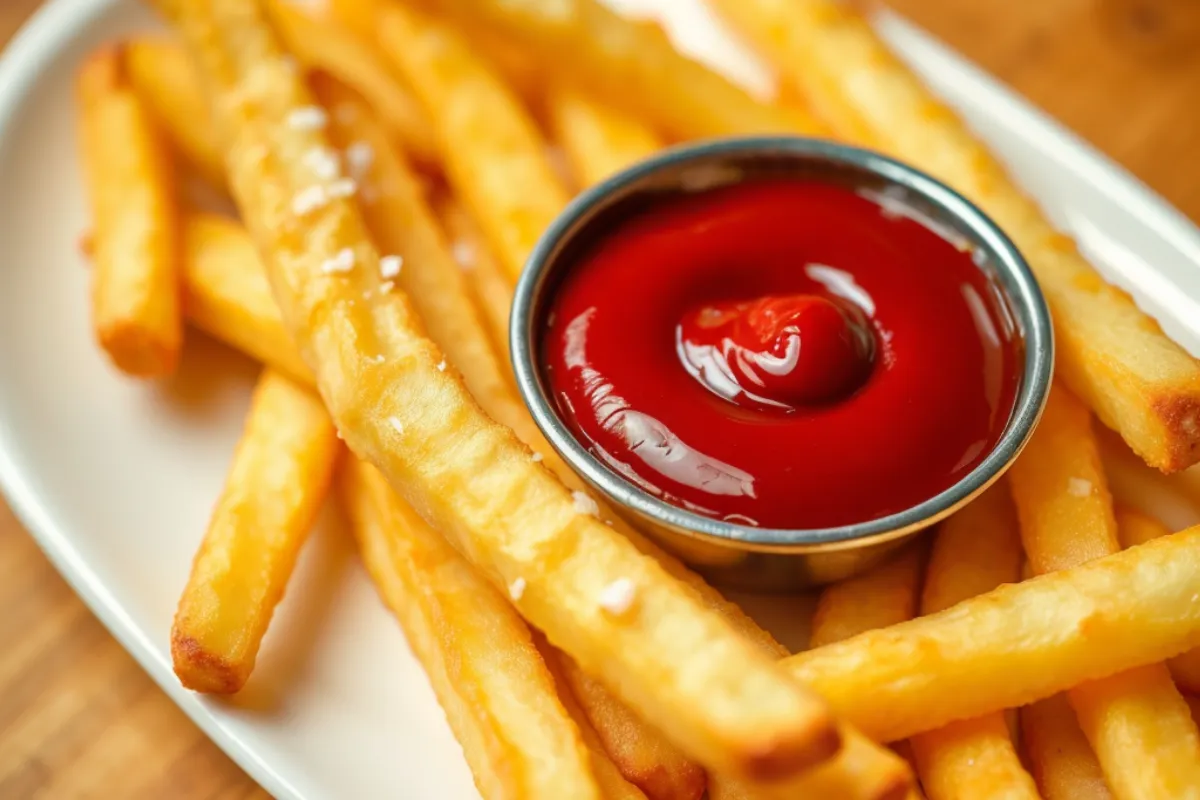French fries are one of the most beloved snacks worldwide, but for those on a gluten-free diet, a common question arises: Do fries have gluten? Understanding whether Potato fries contain gluten is crucial for individuals with celiac disease or gluten sensitivity. This comprehensive guide will explore the factors that determine whether fries are safe to eat, how to identify gluten-free options, and tips for enjoying fries without gluten-related concerns.
Introduction to Gluten and Gluten Sensitivity
Gluten is a protein found in wheat, barley, and rye. It plays a crucial role in the texture of baked goods, providing elasticity and structure. However, for individuals with celiac disease or gluten intolerance, consuming gluten can lead to serious health issues. Celiac disease is an autoimmune disorder where the ingestion of gluten triggers an immune response that damages the small intestine, leading to malabsorption of nutrients. Gluten sensitivity can cause symptoms like bloating, diarrhea, and fatigue, without the intestinal damage seen in celiac disease.
Understanding the impact of gluten on health is essential for those who must avoid it. For more detailed information, you can read about Understanding Celiac Disease.
What Are French Fries? Basic Ingredients and Preparation
French fries are typically made from three main ingredients: potatoes, oil, and salt. The process involves cutting potatoes into strips, frying them until crispy, and seasoning with salt. While this basic recipe suggests that fries should be naturally free of gluten, the reality is more complex.
The way French fries are prepared can introduce gluten, particularly in commercial settings like restaurants and fast food chains. Factors such as cross-contamination, the use of shared fryers, and the addition of seasonings or coatings can all affect whether fries contain gluten. To navigate these challenges, it’s important to understand the factors that can introduce gluten into French fries.
Are French Fries Naturally Gluten-Free?
In their simplest form, Potato fries are naturally free of gluten because potatoes are gluten-free, and so are most cooking oils and salt. However, the potential for gluten contamination arises during the preparation process. For example, if French fries are cooked in a fryer that also processes gluten-containing foods, cross-contamination can occur. This is a common issue in many restaurants and fast food establishments.
Additionally, some French fries may be seasoned with spice blends or coated in batters that contain gluten. For instance, some fast food chains use a wheat-based coating to enhance the crispiness or flavor of their fries, which makes them unsafe for those on a gluten-free diet. Understanding these risks is essential for anyone looking to avoid gluten in their diet. For tips on how to stay gluten-free while dining out, check out these helpful suggestions.
Factors That Can Introduce Gluten to French Fries
Despite their simple ingredients, several factors can introduce gluten to French fries:
- Cross-Contamination During Frying: In many fast food restaurants, French fries are fried in the same oil used for other gluten-containing foods, such as breaded chicken or onion rings. This shared oil can lead to cross-contamination, making the fries unsafe for people with celiac disease or gluten sensitivity.
- Use of Shared Fryers: Even if the French fries themselves do not contain gluten, using a shared fryer with gluten-containing foods can result in contamination. This is a common issue in many fast food chains.
- Seasonings or Coatings: Some French fries are seasoned with spice blends or coated in batters that may contain gluten. For example, some fast food chains add a wheat-based coating to their fries to enhance crispiness or flavor, which makes them unsafe for gluten-free diets.
- Breading and Batters: Some restaurants and food manufacturers coat French fries with a light batter before frying to create a crispy texture. These batters often contain wheat flour, which introduces gluten to the fries.
Identifying Gluten-Free French Fries at Restaurants
Navigating gluten-free eating, especially with French fries, requires knowing how to identify safe options. Here are some tips to help you determine if the French fries you’re eating are truly gluten-free:
- Read Menus and Ask Questions: When dining out, don’t hesitate to ask the restaurant staff about how the French fries are prepared. Inquire whether the fries are cooked in a dedicated fryer or if they share oil with gluten-containing foods. Asking about seasonings or coatings used on the fries is also important.
- Look for Gluten-Free Certifications: Some restaurants may have gluten-free certifications for their menu items. This indicates that the food has been prepared following strict gluten-free protocols.
- Choose Restaurants Carefully: Opt for restaurants that are known for accommodating gluten-free diets. Some establishments use dedicated fryers for their gluten-free items, ensuring that cross-contamination is not an issue.
Some fast food chains are known for offering gluten-free French fries. For instance, Five Guys is praised for its gluten-free fries, cooked in a dedicated fryer with peanut oil.
Safe Preparation of French Fries at Home
The safest way to enjoy gluten-free French fries is to make them at home. This allows you to control the ingredients and preparation methods, ensuring that the fries are truly gluten-free. Here’s a step-by-step guide to making gluten-free French fries at home:
- Choose the Right Potatoes: Russet potatoes are a popular choice for French fries due to their starchy texture, which results in crispy fries. However, you can also use sweet potatoes or other varieties depending on your preference.
- Prep the Potatoes: Wash and peel the potatoes, then cut them into even strips. Soak the potato strips in cold water for at least 30 minutes to remove excess starch, which helps them crisp up during frying.
- Dry the Potatoes: After soaking, drain the potatoes and pat them dry with a clean towel. Removing as much moisture as possible will ensure the fries get crispy.
- Heat the Oil: Use a gluten-free oil with a high smoke point, such as canola or peanut oil. Heat the oil in a deep fryer or large pot to around 350°F (175°C).
- Fry the Potatoes: Fry the potatoes in small batches to avoid overcrowding the pot. Fry them for about 3-5 minutes, or until they are golden brown and crispy. Remove the fries from the oil and drain them on paper towels.
- Season and Serve: Season the fries with salt and any other celiac safe spices or herbs you like. Serve them hot with your favorite dipping sauces.
Making your own celiac safe French fries at home ensures that you avoid cross-contamination and enjoy fries that are safe for your diet.
Common Myths and Misconceptions About Gluten in French Fries
There are several myths and misconceptions surrounding gluten and Potato fries. Here are some of the most common ones:
- Myth: All French fries are gluten-free.
- Fact: While potatoes are celiac safe, the preparation methods can introduce gluten, making some fries unsafe for those with celiac disease or gluten sensitivity.
- Myth: Gluten is always present in French fries.
- Fact: Not all French fries contain gluten. If they are prepared in a dedicated fryer without gluten-containing seasonings or coatings, they can be gluten-free.
- Myth: Potatoes naturally contain gluten.
- Fact: Potatoes are naturally gluten-free. It’s the preparation process that can introduce gluten into French fries.
Understanding these myths can help you make informed choices about the foods you eat and avoid unnecessary concerns.
FAQs About Gluten in French Fries
- Are all fries celiac safe?
Not all fries are celiac safe. It depends on how they are prepared and whether any gluten-containing ingredients or cross-contamination are involved. - What causes fries to contain gluten?
Fries can contain gluten due to cross-contamination in shared fryers, the use of wheat-based coatings, or gluten-containing seasonings. - How can I ensure my fries are gluten-free?
The best way to ensure your fries are gluten-free is to ask about the preparation methods at restaurants and choose fries that are cooked in dedicated fryers. When buying frozen fries, always check the labels for any gluten-containing ingredients. - Which fast food chains offer celiac safe fries?
Chains like Five Guys and In-N-Out Burger offer celiac safe French fries cooked in dedicated fryers. However, chains like McDonald’s and Burger King may use shared fryers, leading to cross-contamination. - Can I make celiac safe fries at home?
Yes, making no gluten chips at home is a great way to ensure they are safe. By using celiac safe ingredients and controlling the cooking process, you can enjoy delicious fries without the risk of gluten contamination. - What about sweet potato fries? Are they gluten-free?
Sweet potato chips are naturally celiac safe, but like regular fries, the preparation method is key. Ensure they are cooked in a gluten-free environment and not seasoned with gluten-containing spices. - How do I store homemade celiac safe fries safely?
Store homemade glutenless fries in an airtight container in the refrigerator for up to 3 days. Reheat them in an oven or air fryer to maintain their crispiness.
Conclusion: Enjoying French Fries on a Celiac Safe Diet
French fries can be a safe and delicious option for those on a celiac safe diet, but it’s essential to be vigilant about how they are prepared. Whether dining out or cooking at home, always check for cross-contamination and read labels carefully. With a bit of caution and knowledge, you can enjoy French fries without compromising your celiac safe lifestyle.
For more information on cooking gluten-free meals at home, you can explore how to cook gluten-free at home.

